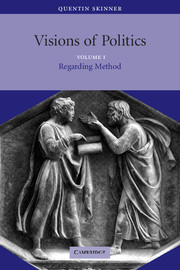Book contents
- Frontmatter
- Contents
- General preface
- Full Contents: Volumes 1–3
- Acknowledgements
- Conventions
- 1 Introduction : Seeing things their way
- 2 The practice of history and the cult of the fact
- 3 Interpretation, rationality and truth
- 4 Meaning and understanding in the history of ideas
- 5 Motives, intentions and interpretation
- 6 Interpretation and the understanding of speech acts
- 7 ‘Social meaning’ and the explanation of social action
- 8 Moral principles and social change
- 9 The idea of a cultural lexicon
- 10 Retrospect : Studying rhetoric and conceptual change
- Bibliography
- Index
4 - Meaning and understanding in the history of ideas
Published online by Cambridge University Press: 05 September 2012
- Frontmatter
- Contents
- General preface
- Full Contents: Volumes 1–3
- Acknowledgements
- Conventions
- 1 Introduction : Seeing things their way
- 2 The practice of history and the cult of the fact
- 3 Interpretation, rationality and truth
- 4 Meaning and understanding in the history of ideas
- 5 Motives, intentions and interpretation
- 6 Interpretation and the understanding of speech acts
- 7 ‘Social meaning’ and the explanation of social action
- 8 Moral principles and social change
- 9 The idea of a cultural lexicon
- 10 Retrospect : Studying rhetoric and conceptual change
- Bibliography
- Index
Summary
The task of the historian of ideas is to study and interpret a canon of classic texts. The value of writing this kind of history stems from the fact that the classic texts in moral, political, religious and other such modes of thought contain a ‘dateless wisdom’ in the form of ‘universal ideas’. As a result, we can hope to learn and benefit directly from investigating these ‘timeless elements’, since they possess a perennial relevance. This in turn suggests that the best way to approach these texts must be to concentrate on what each of them says about each of the ‘fundamental concepts’ and ‘abiding questions’ of morality, politics, religion, social life. We must be ready, in other words, to read each of the classic texts ‘as though it were written by a contemporary’. It is indeed essential to approach them in this way, focusing simply on their arguments and examining what they have to tell us about the perennial issues. If instead we become sidetracked into examining the social conditions or the intellectual contexts out of which they arose, we shall lose sight of their dateless wisdom and thereby lose contact with the value and purpose of studying them.
These are the assumptions I wish to question, criticise and if possible discredit in what follows. The belief that the classic theorists can be expected to comment on a determinate set of ‘fundamental concepts’ has given rise, it seems to me, to a series of confusions and exegetical absurdities that have bedevilled the history of ideas for too long.
- Type
- Chapter
- Information
- Visions of Politics , pp. 57 - 89Publisher: Cambridge University PressPrint publication year: 2002
- 23
- Cited by



